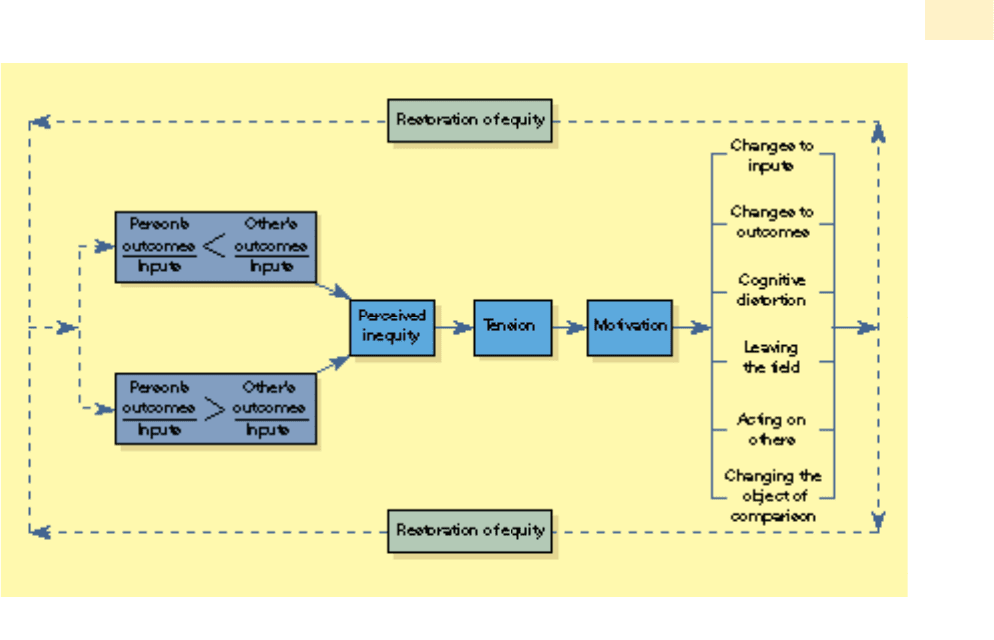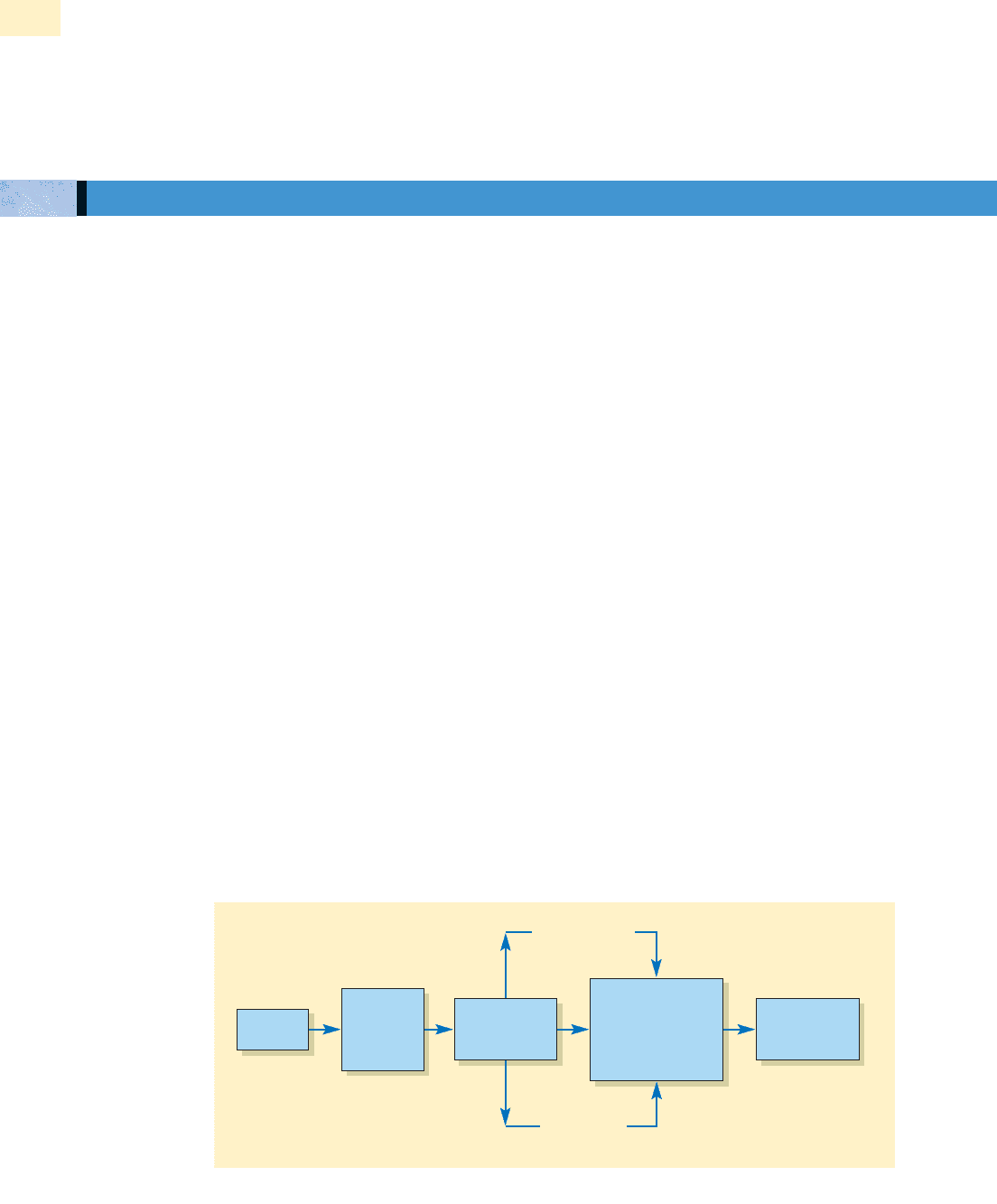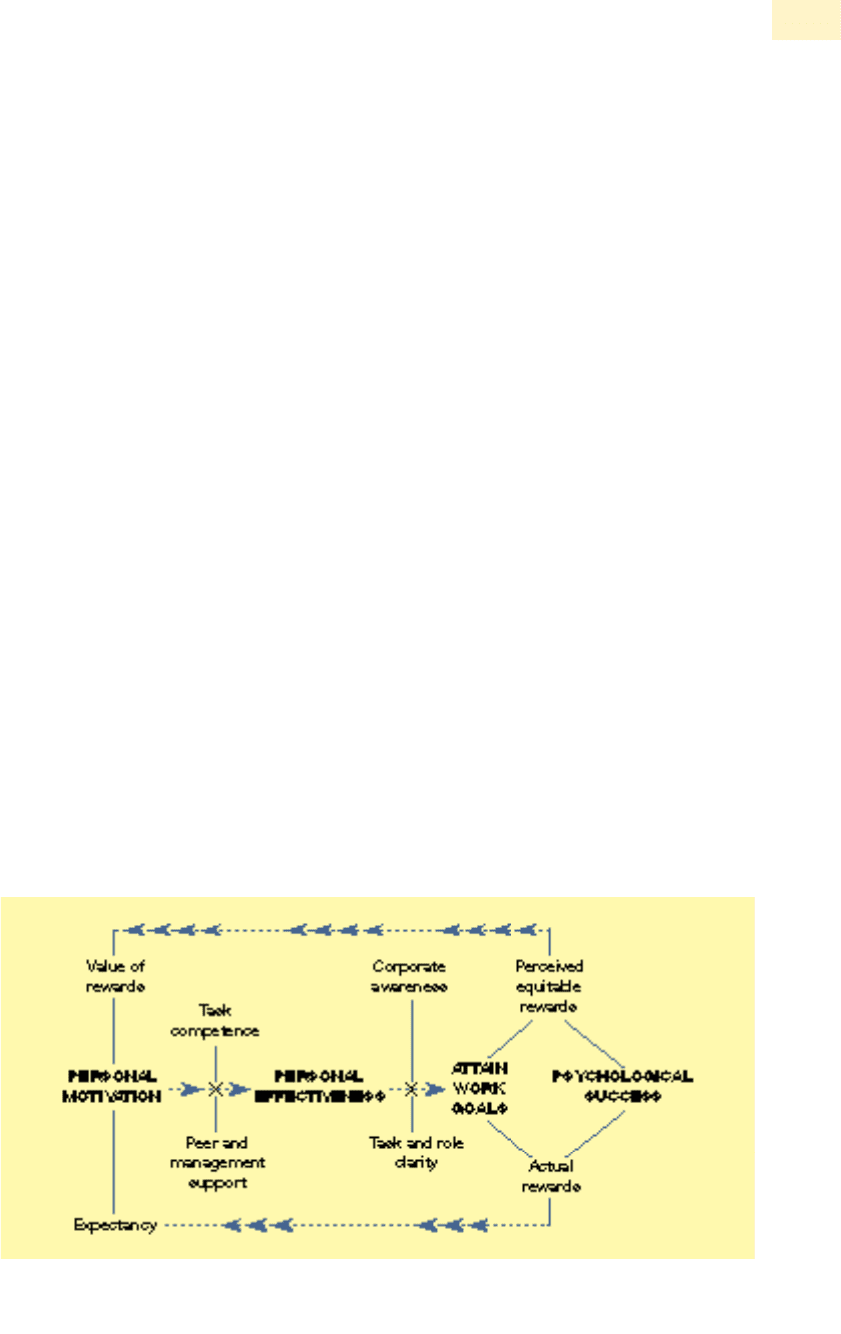Mullins L.J. Management and organisational behaviour, Seventh edition
Подождите немного. Документ загружается.


The distinction between the two types of expectancies arises because they are deter-
mined by different conditions. E → P expectancy is determined in part by the person’s
ability and self-confidence, past experience, and the difficulty of the task. P → O
expectancy is determined by the attractiveness of the outcomes and the belief about
who controls the outcomes, the person him/herself or other people.
There are a number of different versions of expectancy theory. The main elements tend
to be very similar, however, and this suggests the development of a generally accepted
approach. Numerous research studies aimed at testing expectancy models appear to
suggest general support for the theory,
48
but they also highlight difficulties with some
of the concepts involved and with methodology. Expectancy models are not always
easy to understand, or to apply. There are many variables which affect behaviour at
work. A problem can arise in attempting to include a large number of variables or in
identifying those variables which are most appropriate in particular situations.
Expectancy theory does, however, draw attention to the complexities of work mo-
tivation. It provides further information in helping to explain the nature of behaviour
and motivation in the work situation, and helps to identify problems in performance.
Expectancy theory indicates that managers should give attention to a number of fac-
tors, including the following:
■ Use rewards appropriate in terms of individual performance. Outcomes with high
valence should be used as an incentive for improved performance.
■ Attempt to establish clear relationships between effort–performance and rewards, as
perceived by the individual.
■ Establish clear procedures for the evaluation of individual levels of performance.
■ Pay attention to intervening variables such as abilities and traits, role perceptions,
organisational procedures, and support facilities, which, although not necessarily
direct motivational factors, may still affect performance.
■ Minimise undesirable outcomes which may be perceived to result from a high level
of performance, such as industrial accidents or sanctions from co-workers; or to
result despite a high level of performance, such as short-time working or layoffs.
Porter and Lawler emphasise that the expectancy theory model applies only to behav-
iours which are under the voluntary control of the individual. The two general types of
choices over which individuals have voluntary control of work performance in organ-
isations are:
1 the amount of effort and energy expended; and
2 the manner in which they go about performing their work.
Porter and Lawler also emphasise that the expectancy model is just a model.
People rarely actually sit down and list their expected outcomes for a contemplated behaviour,
estimate expectancies and valences, multiply, and add up the total unless, of course, they are
asked to do so by a researcher. Yet people do consider the likely outcomes of their actions, do
weigh and evaluate the attractiveness of various alternatives, and do use these estimates in
coming to a decision about what they will do. The expectancy model provides an analytic tool for
mirroring that process and for predicting its outcome, but it does not purport to reflect the actual
decision-making steps taken by an individual.
49
CHAPTER 12 WORK MOTIVATION AND REWARDS
495
IMPLICATIONS FOR MANAGERS OF EXPECTANCY THEORIES
Just a model

One of the major variables of satisfaction in the Porter and Lawler expectancy model is
perceived equitable rewards. This leads to consideration of another process theory of
motivation – equity theory. Applied to the work situation, equity theory is usually asso-
ciated with the work of Adams.
50
Equity theory focuses on people’s feelings of how fairly they have been treated
in comparison with the treatment received by others. It is based on exchange
theory. People evaluate their social relationships in the same way as buying or selling
an item. People expect certain outcomes in exchange for certain contributions, or
inputs. Social relationships involve an exchange process. For example, a person may
expect promotion as an outcome of a high level of contribution (input) in helping to
achieve an important organisational objective. People also compare their own position
with that of others. They determine the perceived equity of their own position. Their
feelings about the equity of the exchange are affected by the treatment they receive
when compared with what happens to other people.
Most exchanges involve a number of inputs and outcomes. According to equity
theory, people place a weighting on these various inputs and outcomes according to
how they perceive their importance. When the ratio of a person’s total outcomes to
total inputs equals the perceived ratio of other people’s total outcomes to total inputs
there is equity. When there is an unequal comparison of ratios the person experiences
a sense of inequity. The feeling of inequity might arise when an individual’s ratio of
outcomes to inputs is either less than, or greater than, that of other people. For ex-
ample, Adams suggests that workers prefer equitable pay to overpayment. Workers on
piece-rate incentive payment schemes who feel they are overpaid will reduce their level
of productivity in order to restore equity.
Behaviour as a consequence of inequity
A feeling of inequity causes tension, which is an unpleasant experience. The presence of
inequity therefore motivates the person to remove or to reduce the level of tension and
the perceived inequity. The magnitude of perceived inequity determines the level of ten-
sion. The level of tension created determines the strength of motivation. Adams identifies
six broad types of possible behaviour as consequences of inequity (see Figure 12.11).
■ Changes to inputs. A person may increase or decrease the level of his or her inputs,
for example through the amount or quality of work, absenteeism, or working addi-
tional hours without pay.
■ Changes to outcomes. A person may attempt to change outcomes such as pay,
working conditions, status and recognition, without changes to inputs.
■ Cognitive distortion of inputs and outcomes. In contrast to actual changes,
people may distort, cognitively, their inputs or outcomes to achieve the same
results. Adams suggests that although it is difficult for people to distort facts about
themselves, it is possible, within limits, to distort the utility of those facts: for ex-
ample, the belief about how hard they are really working, the relevance of a
particular qualification, or what they can or cannot obtain with a given level of pay.
■ Leaving the field. A person may try to find a new situation with a more favourable
balance, for example, by absenteeism, request for a transfer, resigning from a job or
from the organisation altogether.
■ Acting on others. A person may attempt to bring about changes in others, for
example to lower their inputs or accept greater outcomes. Or the person may cogni-
tively distort the inputs and outcomes of others. Alternatively, a person may try to
force others to leave the field.
PART 4 THE INDIVIDUAL
EQUITY THEORY OF MOTIVATION
496

■ Changing the object of comparison. This involves changing the reference group
with whom comparison is made. For example, where another person with a previ-
ously similar outcome–input ratio receives greater outcomes without any apparent
increase in contribution, that other person may be perceived as now belonging to a
different level in the organisation structure. The comparison need not necessarily be
made with people who have the same inputs and outcomes. The important thing is
a similar ratio of outcomes to inputs.
The manager may seek to remove or reduce tension and perceived inequity among
staff by influencing these types of behaviour – for example, by attempting to change a
person’s inputs or encouraging a different object of comparison. However, there are
likely to be only two courses of action under the direct control of the manager.
Outcomes can be changed by, for example, increased pay, additional perks or improved
working conditions; or by instigating a person leaving the field through transfer, resig-
nation or, as an extreme measure, dismissal.
Kreitner et al. suggest at least seven practical implications of equity theory.
■ It provides managers with another explanation of how beliefs and attitudes affect
job performance.
■ It emphasises the need for managers to pay attention to employees’ perceptions of
what is fair and equitable.
■ Managers benefit by allowing employees to participate in making decisions about
important work outcomes.
■ Employees should be given the opportunity to appeal against decisions that affect
their welfare.
■ Employees are more likely to accept and support organisational change when they
believe it is implemented fairly.
CHAPTER 12 WORK MOTIVATION AND REWARDS
497
Figure 12.11 An illustration of Adams’s equity theory of motivation
Under the
control of the
manager

■ Managers can promote co-operation and teamwork among group members by treat-
ing them equally.
■ Employees denied justice at work are turning increasingly to arbitration and the
courts.
51
Another theory usually considered under the heading of motivation to work is goal
theory, or the theory of goal-setting (see Figure 12.12). This theory is based mainly on
the work of Locke.
52
The basic premise of goal theory is that people’s goals or intentions play an
important part in determining behaviour. Locke accepts the importance of perceived
value, as indicated in expectancy theories of motivation, and suggests that these values
give rise to the experience of emotions and desires. People strive to achieve goals in
order to satisfy their emotions and desires. Goals guide people’s responses and actions.
Goals direct work behaviour and performance, and lead to certain consequences
or feedback. Locke subsequently pointed out that ‘goal-setting is more appropriately
viewed as a motivational technique rather than as a formal theory of motivation.’
53
The combination of goal difficulty and the extent of the person’s commitment to achiev-
ing the goal regulates the level of effort expended. People with specific quantitative goals,
such as a defined level of performance, or a given deadline for completion of a task, will
perform better than people with no set goal or only a vague goal such as ‘do the best you
can’. People who have difficult goals will perform better than people with easier goals.
Gratton refers to ‘Stretch goals’ which are ambitious, highly targeted opportunities
for breakthrough improvements in performance. These goals should stem from critical
success indicators and come from deep discussions within the company, and from col-
laboration within and across task forces, and lead to development of activities and
tactics to achieve the goals.
54
People lacking positive motivation at work may also help
gain improved results and a better sense of achievement by setting themselves specific
goals, and identifying tasks directly related to their work and measurable targets of
time and performance.
Goal theory has a number of practical implications for the manager.
■ Specific performance goals should systematically be identified and set in order to
direct behaviour and maintain motivation.
498
PART 4 THE INDIVIDUAL
GOAL THEORY
Goal difficulty
Level of
commitment
Values
Emotions
and
desires
Goals or
intentions
Responses or
actions
Work behaviour
and performance
Consequence
or feedback
Figure 12.12 An illustration of Locke’s theory of goal-setting
Goal-setting
and
performance
Practical
implications
for the
manager

■ Goals should be set at a challenging but realistic level. Difficult goals lead to higher
performance. However, if goals are set at too high a level, or are regarded as imposs-
ible to achieve, performance will suffer, especially over a longer period.
■ Complete, accurate and timely feedback and knowledge of results is usually associ-
ated with high performance. Feedback provides a means of checking progress on
goal attainment and forms the basis for any revision of goals.
■ Goals can be determined either by a superior or by individuals themselves. Goals set
by other people are more likely to be accepted when there is participation. Employee
participation in the setting of goals may lead to higher performance.
55
Much of the theory of goal-setting can be related to the system of Management
by Objectives (discussed in Chapter 7). MBO is often viewed as an application of
goal-setting, although MBO was devised originally before the development of goal-
setting theory.
A number of research studies have attempted to examine the relationship between
goal-setting and performance. Although, almost inevitably, there are some contrary
findings, the majority of evidence suggests strong support for the theory, and its effects
on motivation.
56
However it is viewed, the theory of goal-setting provides a useful
approach to work motivation and performance. And Hannagan goes so far as to suggest
that: ‘at present goal-setting is one of the most influential theories of work motivation
applicable to all cultures’.
57
A more recent approach to the study of motivation is attribution theory. Attribution is
the process by which people interpret the perceived causes of behaviour. Attribution
theory has been discussed in Chapter 11.
Given that most major theories of motivation date back many years it is inevitable that
questions will be raised about their relevance today. For example, Reis and Pena ques-
tion whether motivating people to work in the 21st century with theories conceived
during the past 100 years is likely to be infeasible. They conclude that the core message
is that managers should reconsider the outdated motivational patterns utilised to
maintain role performance in organisations and adopt a fresh motivation formula for
the 21st century based on friendship, work and respect.
58
However, we have seen from the discussions above that there still appears to be gen-
eral support for the theories – and, perhaps ironically, particularly for the early theories
of Maslow and Herzberg and McGregor. A Chartered Management Institute checklist
maintains that these theories are still valid today. ‘A basic understanding of their main
principles will be invaluable for building a climate of honesty, openness and trust.’
59
From a 12-year study of the use of management concepts in technical organisations,
Flores and Utley found the work of Maslow and McGregor the most popular motiva-
tional theories and also refer to the relationship between Maslow and Herzberg and the
successful implementation of quality systems.
60
Whatever the popularity of different theories of motivation, doubts are raised about
their universality on the ground that they have not adequately addressed the factor of
culture.
61
CHAPTER 12 WORK MOTIVATION AND REWARDS
499
ATTRIBUTION THEORY
RELEVANCE OF THEORIES OF MOTIVATION

Are theories of motivation universally applicable or are there meaningful differences in
motivation at work, or in life more generally, in different societies? Many readers may
feel able to recognise perceived variations in extrinsic, intrinsic and relational aspects
of motivation as a result of experience of foreign cultures. Do similarities in workplace
attitudes and behaviour outweigh differences? A number of writers have questioned
whether motivational theories and models originating in one culture are amenable to
transference to other parts of the world. Francesco and Gold devote a substantial propor-
tion of a discussion of motivation to examining the extent to which American
motivation theories are applicable outside the United States.
In Chapter 2 it was noted that classifications of culture often delineate societies
along dimensions such as individual or group orientation or attitudes to power dis-
tance, so it would appear perfectly reasonable to identify the extent to which our own
understanding of motivation is culture-specific. When discussing Maslow’s contribu-
tion to this topic and, in particular, the concept of a hierarchy of needs, Francesco and
Gold suggest that: ‘the circumstances and values of a particular culture can influence
the ordering and importance of needs. The values of individualism and collectivism
can make the hierarchy more or less relevant.’
62
These authors go on to indicate that
cultures which in Hofstede’s framework are high on uncertainty avoidance may see
individuals value safety and security needs more than the so-called higher order needs
such as self-actualisation, while citizens of ‘feminine’ societies may place a particularly
high importance on working relationships and work/life balance. See p. 49 for a sum-
mary of Hofstede’s model and the clusters of countries he identifies.
In evaluating McClelland’s work, Francesco and Gold question whether the meaning
of an underlying concept, in this case achievement, can even be understood worldwide
in the sense it was intended: ‘Another concern with Learning Needs Theory is that the
concept of achievement is difficult, if not impossible, to translate into languages other
than English.’
63
It has already been suggested that one criticism of content theories of motivation
centres on its relative applicability in different circumstances and the suggestion that
there may be variations across cultures falls within this line of reasoning. However, per-
haps less obviously, process theories of motivation have also been criticised for being
culture-bound. As they focus on process rather than content, such theories may appear
to be more applicable in diverse cultural contexts. Nonetheless it has been suggested
that process theories of motivation contain certain inbuilt assumptions that are them-
selves culturally derived.
Adler reminds us that expectancy models of motivation assume that individuals
believe that they can, to some extent, control their environment and influence their
own fate. If, as in the cases of more fatalistic cultures such as China, people do not
have the same sense of internal attribution, the expectancy model may have less force
and therefore applicability. When Adams’s equity theory is applied across the world
differences in interpretation have been recorded.
64
Chen suggests that while individual-
istic cultures place a high regard on equity, collectivist cultures value equality more
than equity. Again we see here the possibility that while a theory of motivation may be
essentially valid in principle, it is legitimate to think about the ways in which national
culture can intervene in terms of its interpretation in different societies.
65
Recent advantages in telecommunications and in scientific and technological knowl-
edge have led to greater emphasis on the knowledge and expertise of staff, and the
importance of creativity. Tampoe suggests that at the core of the new industrial trend
PART 4 THE INDIVIDUAL
CROSS-CULTURAL DIMENSIONS OF MOTIVATION
500
THE MOTIVATION OF KNOWLEDGE WORKERS

are the ‘knowledge workers’ – those employees who apply their theoretical and practi-
cal understanding of a specific area of knowledge to produce outcomes of a
commercial, social or personal value. The performance of knowledge workers should be
judged on both the cleverness of ideas and the utility and commercial value of their
applied knowledge. Creativity is necessary and needs to be encouraged but should be
bounded by commercial realism. This presents management with a new challenge of
how to motivate the knowledge workers.
66
Tampoe suggests that the personal motivation of knowledge workers is based on the
value they place on the rewards they expect to earn at work. In addition to the individ-
ual’s own motivation, the performance of knowledge workers is dependent upon four
key characteristics (see Figure 12.13).
■ task competence;
■ peer and management support;
■ task and role clarity; and
■ corporate awareness.
The challenge to management is to ensure the effectiveness of the four key variables
and to recognise the need for staff to supervise and manage themselves and the wider
rewards expected by knowledge workers.
Suggestions on developing reward strategies to motivate and compensate knowl-
edge workers are given in Management in Action 12.1 at the end of this chapter.
A climate of creativity
Lucas draws attention to skills shortages as one of the biggest challenges facing
employers in the new millennium. In order to attract and keep talented individuals,
the so-called knowledge workers, organisations cannot rely simply on a pay rise or cash
bonus but have to be more creative about the way they structure remuneration pack-
ages. Individual performance-related pay is still the most widely used reward strategy,
but attention is also given to employee share ownership, competence-related pay and
to team reward – and also to non-cash incentives such as gift vouchers. However, Lucas
points out that employees, especially high flyers, rank challenging and interesting
work and freedom higher on their motivational list than money and performance-
CHAPTER 12 WORK MOTIVATION AND REWARDS
501
Figure 12.13 Motivating knowledge workers
(Reproduced with permission from Mahen Tampoe, ‘Knowledge Workers – The New Management Challenge’, Professional Manager,
Institute of Management, November 1994, p. 13.)

related pay. ‘Research suggests that most organisations haven’t recognised the need to
identify and tap into their employees’ personal motivators.’
67
A report from the Chartered Institute of Personnel and Development draws attention to
the management of knowledge workers highlighting the importance of autonomy,
challenging work and sharing in the creation of organisational values. With the devel-
opment of new technology it is important to motivate employees to capture, share and
transfer knowledge.
68
Whitmore suggests that in order to create a climate for creativity among employees,
recognition must be given to the importance of two human needs that rise above all
others and exist independent of race, creed and culture – the need for self-belief and
the development of emotional intelligence; and the ever-present need that every
human being has for a sense of meaning and purpose in their lives. ‘Self-belief and
meaningful work are the fundamental bedrocks that underlie business performance. Of
course, pay and conditions are important too, but we know that. It is these two others
that are barely recognised … but business leaders ignore them at their peril.’
69
502
PART 4 THE INDIVIDUAL
CRITICAL REFLECTIONS
‘Why all this fuss about motivation? Surely, motivating people is easy – I was taught that if you
are not motivated, then you are dead. And I seem to remember something about a natural hier-
archy of human needs …’
‘Yes, fair enough but the real issues for management is motivating people to work to the best
of their abilities and directing their efforts to the goals of the organisation – and this is certainly
not always easy.’
What are your own views?
In an organisation, empowerment means that each staff member is responsible for creating that
organisation’s culture. There aren’t many motivating forces more potent than giving your staff an
opportunity to exercise and express their idealism.
Roddick, A. Business As Unusual: the Triumph of Anita Roddick, Thorsons (2000), p. 70.
How would you, in practical terms, attempt to provide members of your staff with the
opportunity to exercise their idealism?
‘All the ideas and theories that abound about motivation at work are redundant when it comes to
basicissues – money is the only thing that motivates people in the real world. For example, in a
recession you can motivate employees to do anything as long as they feel their job is under
threat.’
Debate.

■
The study of motivation is concerned, basically, with why people behave in a certain
way.
The underlying concept of motivation is some driving force within individuals by
which they attempt to achieve some goal in order to fulfil some need or expectation.
Individuals have a variety of changing, and often competing, needs and expectations
which they attempt to satisfy in a number of different ways. One useful three-fold
classification of individual needs and expectations at work is economic, intrinsic and social.
■ If a person’s motivational driving force is blocked and they are unable to satisfy
their needs and expectations, this may result either in constructive, problem-solving
behaviour or in frustration-induced behaviour. Main reactions to frustration are aggres-
sion, regression, fixation and withdrawal. The rational–economic concept of
motivation has drawn attention to the influence of money as a motivator. Although
clearly a motivator for the majority of people the importance of and extent to which
money influences organisational performance depends upon personal circumstances
and other available rewards.
■ There are many competing theories which attempt to explain motivation at work.
The different theories may be divided into two contrasting groups: content theories
and process theories. Content theories place emphasis on what motivates and are con-
cerned with identifying people’s needs and their relative strengths, and the goals they
pursue in order to satisfy these needs. Main content theories include: Maslow’s hier-
archy of needs model; Alderfer’s modified need hierarchy model; Herzberg’s two-factor
theory; and McClelland’s achievement motivation theory.
■ Process theories place emphasis on the actual process of motivation. These theor-
ies are concerned with the relationships among the dynamic variables which make up
motivation, and with how behaviour is initiated, directed and sustained. Many of the
process theories cannot be linked to a single writer, but major approaches under this
heading include: expectancy-based models; equity theory; goal theory; and also attri-
bution theory.
■ These different theories are not conclusive and have been subject to alternative
findings, particularly the content theories. However, it is because of the complexity of
motivation that these different theories are important to the manager and many writ-
ers still expound their relevance today. They help demonstrate the many motives that
influence people’s behaviour at work. They provide a framework within which to direct
attention of how best to motivate and reward staff to work willingly and effectively.
The manager must evaluate their relevance and judge how best and to what extent
they might be applied with advantage in particular work situations.
■ One major doubt concerning the different theories of motivation is about their
universality, on the grounds that they do not adequately address the factor of culture.
A number of writers have drawn attention to cross-cultural dimensions of motivation
and questioned whether theories and models originating in one culture are amenable
to transference to other parts of the world. With developments in telecommunications
and scientific and technological knowledge, management faces a new challenge of
how best to motivate knowledge workers and create a climate of creativity.
CHAPTER 12 WORK MOTIVATION AND REWARDS
503
SYNOPSIS

504
PART 4 THE INDIVIDUAL
MANAGEMENT IN ACTION 12.1
Developing reward strategies to motivate and compensate
knowledge workers
Mahen Tampoe
Introduction
This is a synopsis of research-based findings on the motiv-
ation of knowledge workers and suggests that current reward
strategies fail to excite the intrinsic motivational drives of this
category of staff; furthermore, it suggests that in certain cir-
cumstances current reward strategies are counter-productive.
It then goes on to offer a motivation and performance model
which links reward strategies, organisational climates and
individual competencies and to suggest actions which organi-
sations can take to realise the promise of this model.
Knowledge workers– who are they?
Knowledge workers are those who apply their theoretical and
practical understanding of an area of knowledge to produce
outcomes that have commercial, social or personal value.
They are likely to be drawn from a wide variety of profession-
ally qualified and scientifically trained staff. Among them
would be: doctors, scientists, computer specialists, personnel
professionals, qualified accountants, managers, project man-
agers and supervisors of knowledge workers who themselves
have been promoted from being technologists to managers.
Characteristics of knowledge workers
Certain characteristics of knowledge workers differentiate
them from other process dominant workers. While some of
these are to do with their education and training, others are to
do with the standards and expectations of their profession.
Their work can also be distinguished in different ways.
Namely, their work is:
■ unlikely to be routine or repetitive;
■ carried out to professional or quality standards and sub-
ject to these as well as the organisation’s own standards
of verification and approval (sometimes resulting in a con-
flict between work and professional standards);
■ aimed at meeting operational or strategic targets derived
from project objectives or established as part of a prob-
lem-solving activity;
■ intrinsically motivational and provides the inner drive (as
opposed to external stimulus) for creative achievement;
■ continuously developing their knowledge and skill in their
chosen area of expertise;
■ amenable to self-management;
■ not easily supervised, partly because of the specialist
nature of their work and partly due to the fact that their work
is not amenable to physical observation and measurement;
■
less easy to procedurise and/or quantify, making it often more
difficult to specify clear unambiguous performance targets;
■ likely to have areas of high ambiguity, and to be suscepti-
ble to many different yet feasible solutions and outcomes.
Motivators for knowledge workers
Based on research carried out by the author, the work of other
researchers and from personal experience of managing IT pro-
fessionals over many years, the rewards and expectations of
these knowledge workers can be summarised as a mixture of
the following:
■ personal growth, especially self-development rather than
growing managerial or professional skills;
■ autonomy, which gives them the freedom to work within
the rules rather than working to rule or being allowed to
define their own rules;
■ creative achievement, where the work is of commercial
value rather than meeting assigned targets or being work
that is intellectually stimulating but not of commercial value;
■ financial rewards, where salary plus bonus on personal
effort is valued more than salary plus bonus on group
effort or purely receiving a salary and fringe benefits.
Financial rewards played a very small part in this as most of
those who supported the research study were in well paid
jobs and were seeking self-actualisation rewards.
The strength of preference shown for these different moti-
vators and the findings of other researchers in this field over
the last 50 years suggest that the law of diminishing returns
applies very definitely to financial incentives. However, when
it comes to intrinsic incentives such as personal growth, cre-
ative achievement and autonomy, the law of escalating
returns seems to apply. This is most pronounced in the area
of creative achievement where the more they get the more
they wish to get. The expectancy theory of motivation
(Vroom, Porter and Lawler among others) suggests that
reward strategies should be designed to optimise these inher-
ent and intrinsic motivational drivers while allowing for
Herzberg’s theory of dissatisfiers and satisfiers.
Theoretical fit
Motivational researchers and theorists who have studied the
motivation of knowledge workers agree that the Expectancy
Theory of motivation is the most appropriate for this category
of employee. The application of expectancy theory in reward
strategies does suggest a very close and intricate link
between rewards, the likelihood of earning those rewards and
the realisation of those rewards, if performance is delivered.
Based on my research and developing on others, it is possi-
ble to hypothesise a motivation and performance model. The
model suggests that the creative energy of people needs to
be applied to task achievement through the application of
their personal capability and the organisation’s strengths,
usually made up of resources, peer support, management
support and finances.
